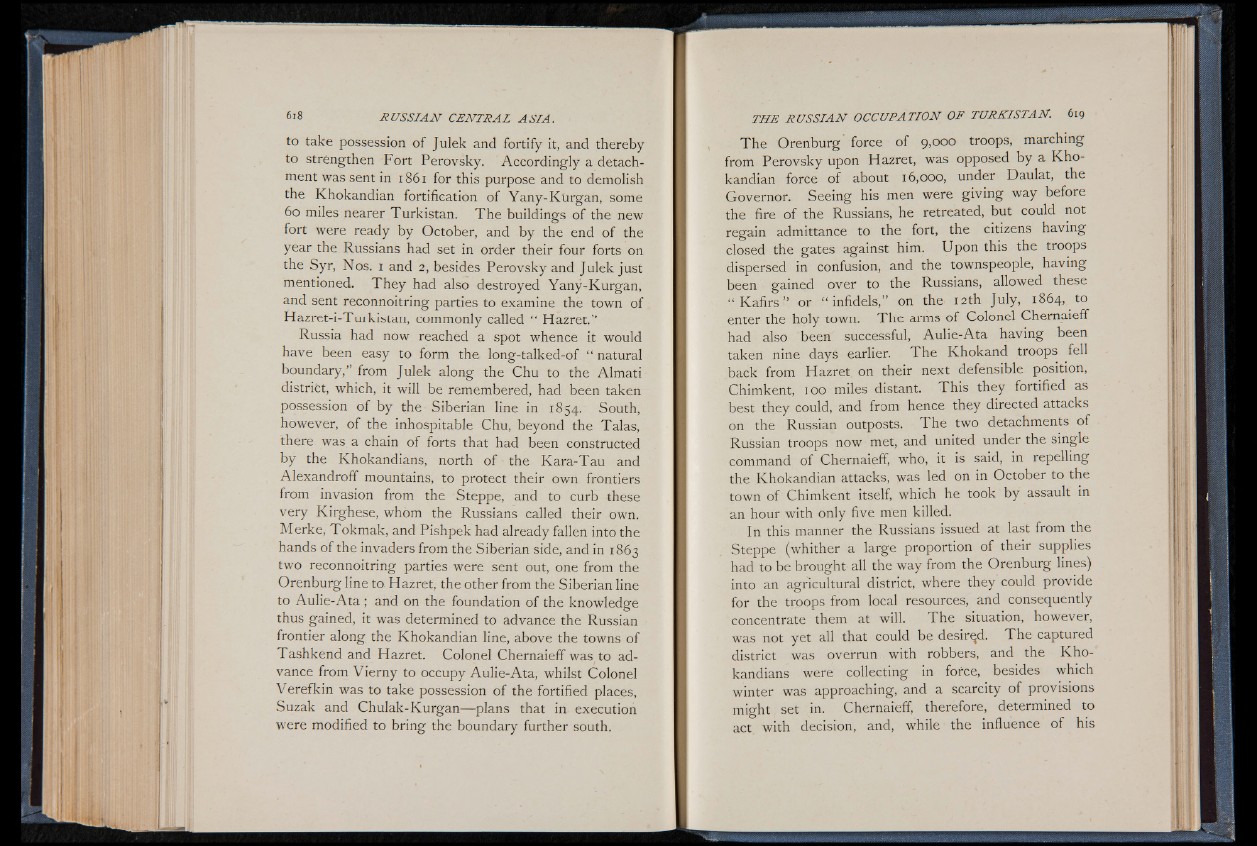
to take possession of Julek and fortify it, and thereby
to strengthen Fort Perovsky. Accordingly a detachment
was sent in 1861 for this purpose and to demolish
the Khokandian fortification of Yany-Kurgan, some
60 miles nearer Turkistan. The buildings of the new
fort were ready by October, and by the end of the
year the Russians had set in order their four forts on
the Syr, Nos. 1 and 2, besides Perovsky and Julek just
mentioned. They had also destroyed Yany-Kurgan,
and sent reconnoitring parties to examine the town of
Hazret-i-Turkistan, commonly called “ Hazret.”
Russia had now reached a spot whence it would
have been easy to form the long-talked-of “ natural
boundary,” from Julek along the Chu to the Almati
distrifct, which, it will be remembered, had been taken
possession of by the Siberian line in 1854. South,
however, of the inhospitable Chu, beyond the Talas,
there was a chain of forts that had been constructed
by the Khokandians, north of the Kara-Tau and
Alexandroff mountains, to protect their own frontiers
from invasion from the Steppe, and to curb these
very Kirghese, whom the Russians called their own.
Merke, Tokmak, and Pishpek had already fallen into the
hands of the invaders from the Siberian side, and in 1863
two reconnoitring parties were sent out, one from the
Orenburg line to Hazret, the other from the Siberian line
to Aulie-Ata ; and on the foundation of the knowledge
thus gained, it was determined to advance the Russian
frontier along the Khokandian line, above the towns of
Tashkend and Hazret. Colonel Chernaieff was to advance
from Vierny to occupy Aulie-Ata, whilst Colonel
Verefkin was to take possession of the fortified places,
Suzak and Chulak-Kurgan— plans that in execution
were modified to bring the boundary further south.
The Orenburg' force of 9,000 troops, marching
from Perovsky upon Hazret, was opposed by a Khokandian
force of about 16,000, under Daulat, the
Governor. Seeing his men were giving way before
the fire of the Russians, he retreated, but could not
regain admittance to the fort, the citizens having
closed the gates against him. Upon this the troops
dispersed in confusion, and the townspeople, having
been gained over to the Russians, allowed these
“ K a firs’’ or “ infidels,” on the 12th July, 1864, to
enter the holy town. The arms of Colonel Chernaieff
had also been successful, Aulie-Ata having been
taken nine days earlier. The Khokand troops fell
back from Hazret on their next defensible position,
Chimkent, 100 miles distant. This they fortified as
best they could, and from hence they directed attacks
on the Russian outposts. The two detachments of
Russian troops now met, and united under the single
command of Chernaieff, who, it is said, in repelling
the Khokandian attacks, was led on in October to the
town of Chimkent itself, which he took by assault in
an hour with only five men killed.
In this manner the Russians issued at last from the
Steppe (whither a large proportion of their supplies
had to be brought all the way from the Orenburg lines)
into an agricultural district, where they could provide
for the troops from local resources, and consequently
concentrate them at will. The situation, however,
was not yet all that could be desirqd. The captured
district was overrun with robbers, and the Khokandians
were collecting in force, besides which
winter was approaching, and a scarcity of provisions
might set in. Chernaieff, therefore, determined to
act with decision, and, while the influence of his